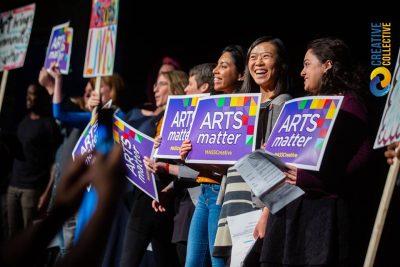The non-profit arts sector has taken a hard hit economically because of the COVID-19 crisis, with $4.5 billion lost in revenue and income nationwide, according to a survey by Americans for the Arts. However, many arts and culture organizations have made efforts to support artists whose income is affected by the recent changes in commerce.

One of these organizations, MASSCreative, which advocates for public policy centered around the creative sector, has devoted much of its attention to helping artists in this new age. Emily Ruddock, executive director at MASSCreative, said artists are uniquely challenged by coronavirus-related financial burdens because of the nature of the industry.
“The cultural and creative sector in many ways really relies on bringing people together and having them come into our spaces,” Ruddock said. “I observed a lot of amazing organizations close their doors in an effort to advance good public health guidelines, which meant that they stopped having revenue come in.”
Ruddock said MASSCreative has been working to promote and translate local, state and federal legislation that affect artists. She said they spread information about existing policy and then develop policy recommendations to encourage officials to best support artists.
“We wanted to make sure folks knew about what the governor was releasing in terms of recommendations to keep people home and keep them safe,” Ruddock said. “We also wanted to make sure that they knew we were there advancing and thinking about what were the pieces of policy and the decision and regulatory decisions that would help the creative sector through this.”
Ruddock said MASSCreative also strives to support people facing potential evictions during this time where paying rent may be unrealistic.
“We’ve joined in support with the housing community and housing activists to say this is something that MASSCreative is really supportive of as well,” Ruddock said.
MASSCreative is not alone in this effort. The Record Co., a non-profit dedicated to helping artists access affordable workspaces and professional training, has created the Boston Music Maker COVID-19 Fund to assist struggling artists, Maria Bartolotta, the community manager at the organization, said.
Bartolotta said that while they are trying to serve as many people they can, the need is great. Of the 1,100 applications they have received so far, they have funded 450 artists, she said.
“The maximum amount we’re sending out is $200,” Bartolotta said. “Almost every single application is way more than that, but we made the really tough decision to help a lot of people a little bit because we knew there were going to be so many people that needed some kind of assistance.”
Kara Elliot-Ortega, the chief of arts and culture for the City of Boston, is also helping support artists in this time. She wrote in an email that the Mayor’s Office has modified the Opportunity Fund to operate as the Boston Artist Relief Fund, which will formally replace the Opportunity Fund on June 30.
Partially funded by donations from the Boston Center for the Arts, the fund will best support artists facing financial loss by providing $500 to those approved, Elliot-Ortega wrote.
The Mayor’s Office has recently hired an Arts and Emergency Preparedness Coordinator to help promote and provide resources to support the arts during this time, Elliot-Ortega wrote. The office is also creating a calendar highlighting virtual events in arts and culture to post on their website.
Despite challenges, Elliot-Ortega wrote that with these new steps in place, the Mayor’s Office is confident they will persevere.
“This is an unprecedented time for all of us, and is particularly difficult for artists, creatives, and gig workers who are losing a significant amount of income due to cancelled performances, events, and classes,” Elliot-Ortega wrote. “We know the impact that the arts can have on communities, especially during times of crisis, and we’re confident that we’ll be able to come together as a community to get through this together.”
Carole Charnow, the president and chief executive officer of the Boston Children’s Museum, said artists will be essential to getting the community back on its feet after the crisis.
“I think we’re going to really need our artists to get ourselves out of this,” Charnow said. “I just hope that they will be whole and they will be well, and they will get through this crisis and be able to do what they do best when we return to some semblance of community, which is what really art is all about.”






















































































































